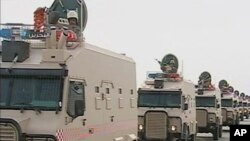Iran has called the military intervention in Bahrain by other countries "unacceptable."
The criticism from the mostly-Shi'ite country comes a day after a Saudi-led military force entered the small Gulf kingdom to support its minority Sunni government.
About 1,000 Saudi soldiers and some 500 police from the United Arab Emirates crossed the causeway that connects mostly-Sunni Saudi Arabia with Bahrain. They were answering a call for help from Bahrain's monarchy to protect government buildings following weeks of protests by members of the Shi'ite majority.
Bahrain invoked the collective security agreement of the six-nation Gulf Cooperation Council. But it remains unclear whether other members of the bloc - Oman, Kuwait and Qatar - will also contribute forces.
The intervention was denounced earlier by the country's Shi'ite opposition as an occupation. It came one day after protesters blocked access to Bahrain's financial district with barricades.
The U.S. State Department Tuesday urged its citizens against travel to the Gulf country and advised Americans in Bahrain to consider leaving. It said U.S. citizens should avoid all demonstrations because they could escalate into violence.
In Washington, White House spokesman Jay Carney called on countries of the Gulf region to show restraint but said the United States does not consider the arrival of foreign forces in Bahrain an invasion. He did not call for the withdrawal of the Saudi and UAE forces.
Oil-rich Bahrain is home to the U.S. Navy's Fifth Fleet, which provides support to U.S. troops in Iraq and Afghanistan.
U.S. Defense Secretary Robert Gates was in Bahrain on Saturday and urged the government to institute reforms. He also expressed concern that the on-going protests could provide an opening for Shi'ite Iran's government to escalate sectarian tensions in the region.
Bahrain's ruling family has offered to hold a dialogue with opposition groups on democratic reforms. But protest leaders are first demanding the creation of a constitutional monarchy in which the parliament would have more power. There have also been calls for the ouster of the ruling al-Khalifa family.
Some information for this report was provided by AP and Reuters.




